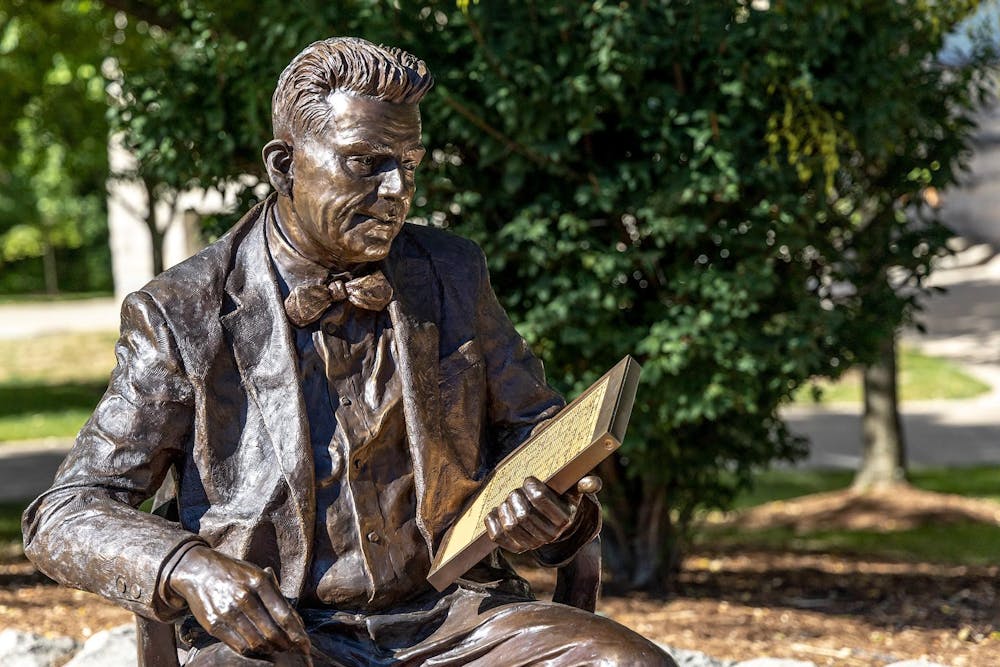The state is still not convinced IU is complying with the law regarding the Kinsey Institute, according to an Oct. 8 letter to IU President Pamela Whitten and the IU Board of Trustees from Indiana Attorney General Todd Rokita and State Comptroller Elise Nieshalla.
Rokita and Nieshalla believe IU must move Kinsey out of Lindley Hall, according to the letter, though the text of the law only prohibits the use of state funds for the institute and does not explicitly require a location change.
Though IU charges the Kinsey Institute for its use of Lindley Hall, which the institute pays for using third-party funds from the Indiana University Foundation, the officials claim in their letter that the law prohibits the use of state property for the institute regardless.
The pair sent their first letter to IU on July 31, demanding confirmation the institute complies with state law. IU replied to the letter on Aug. 29.
Rokita and Nieshalla responded on Oct. 8 with a second letter, writing IU’s response “contained a lack of detail,” and they disagreed with the university about its claim that the institute is compliant with IC-21-20-6, which prohibits state appropriations for any costs associated with the Kinsey Institute, including land, utilities or maintenance.
The Indiana General Assembly initially passed a budget in February 2023, which prohibited state funds for the institute. Rep. Lorissa Sweet, R-Wabash, proposed the amendment to House Bill 1001, alleging, without evidence, that the institute conducted child sex studies and harbored sexual predators. The amendment passed with a vote of 53-34.
Indiana Gov. Eric Holcomb signed the state budget bill into law, which went into effect in July 2023.
The Kinsey Institute was established in 1947 by Alfred Kinsey, a biologist, sexologist and professor at IU. It is a leading research institute on sexuality, gender and relationships and contains one of the largest sexological collections in the world.
Rokita and Nieshalla requested the following information in their letter:
- IU’s plan to restore state funds, if any, to the university that may have been used to fund the Kinsey Institute since July 1, 2023.
- IU’s plan to move the Kinsey Institute from Lindley Hall.
- IU’s plan to end fees and tuition from supporting the Kinsey Institute.
- Details about training program participant fees used to fund the Kinsey Institute.
"IU is currently in compliance with state law and will continue to report necessary financial information to the state,” Mark Bode, IU executive director of media relations, wrote in an email to the Indiana Daily Student in December. “We remain committed to both supporting the Kinsey Institute and following state statute."
The Indiana Attorney General Office did not respond to a request for comment. Representatives from Kinsey also did not respond to interview requests.
Last year, IU considered splitting the Kinsey Institute into a separate 501(c)(3) nonprofit organization, but its archives would remain under the university’s ownership.
The proposal received backlash from Kinsey faculty, students and members of the IU community. They raised concerns about the separation of the institute’s collections, loss of protection from the university, research, fundraising and branding.
One supporter’s change.org petition collected more than 10,000 signatures, and the IU Board of Trustees tabled the discussion at its meeting Nov. 9-10, 2023.
IU then formed the Kinsey Institute Special Working Group, made of Kinsey faculty and IU administrators, which hosted three public listening sessions in January.
The working group decided in February the institute could remain part of the university without violating state law. IU’s audit firm, Plante Moran, approved the report, which recommended creating a separate balance sheet and income statement for the institute and using non-state funding sources to cover expenses not supported by external funds.
The IU Board of Trustees unanimously voted March 1 to forgo the establishment of a nonprofit entity for the institute. The board decided to develop and submit a plan to the Indiana State Board of Accounts to ensure no state funds supported the institute.




